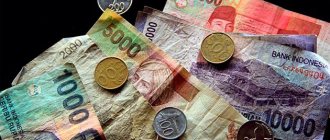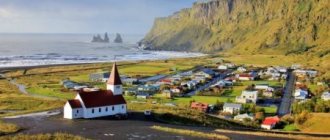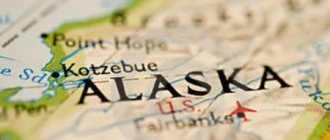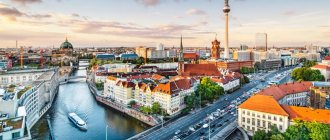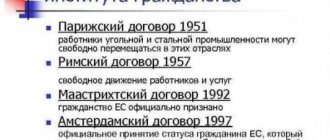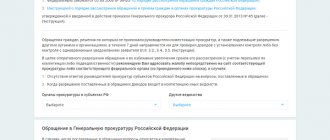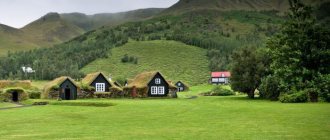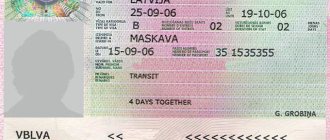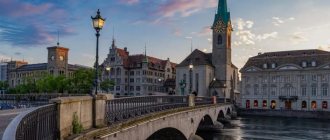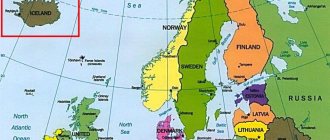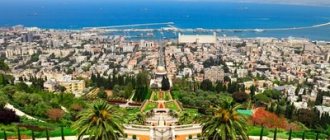Emigration to Iceland is not very popular among Russians or Ukrainians, and therefore there is a shortage of information about moving to this country for permanent residence in Russian. To the USA, Spain, Greece, the Dominican Republic - even moving to Japan and China is considered real and quite understandable.
Ancient house in Iceland
But in order for Russians, who are accustomed to living in the far north in the tundra, and in the mountains of the Urals and Caucasus, to be drawn to an even greater adventure, something extremely tempting must happen that will bring benefits. In connection with the events taking place in Russia and Ukraine, in 2021, many began to consider all possible options for moving to calm countries with a higher standard of living.
However, not everything is predictable; sometimes fate takes turns that are impossible to prepare for, and which you learn about at the moment it happens. If fate hands you a one-way ticket to Iceland, should you refuse? Maybe there you will find a paradise for your soul.
Icelandic mentality
It is impossible to compare the Icelandic mentality with the European one, but it is partly similar to the Scandinavian one. This nation lived very ascetically until the mid-20th century, which was due to its remoteness from the mainland. The descendants of the Vikings preserved their traditions and still honor them today. True, modernity has not spared the island, as we will tell you later.
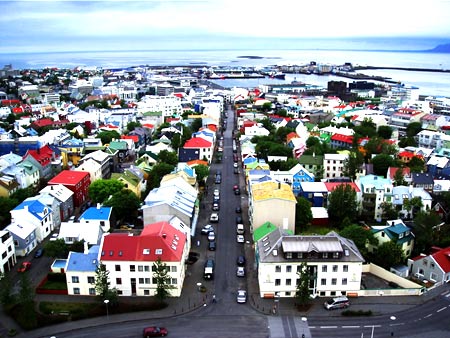
Panoramic view of Reykjavik
The people here are hardworking, accustomed to making money with their own hands: fishing, farming, extracting minerals. When the United States and Great Britain considered Iceland “their” territory, the inhabitants of the island responded to this intervention in a unique way, turning the situation to their advantage.
They managed to establish a fishing industry with sales of products to these countries, and then throughout the world. The state grew rich before our eyes. To this day, residents work in their traditional sectors of the economy; the service sector, for example, tourism, has partly begun to develop.
Europeans may consider Icelanders to be rednecks due to their habits from their past rural life, since the population became urban only relatively recently. They are simple people, but honest and accustomed to following rules and laws. Sometimes the pedantic ones, however, have great fun and go out on holidays, pouring strong drinks non-stop and snacking on haukarl.
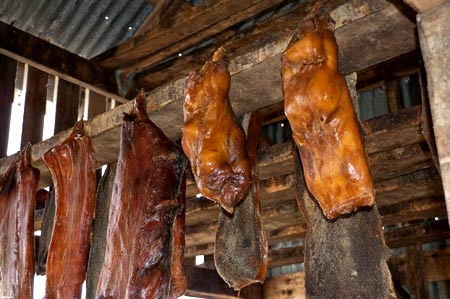
Haukarl is the national dish of Iceland
This national Icelandic dish will seem completely disgusting and terrible to our taste, since it is rotten shark meat. The Vikings also came up with a way to eat the meat of Greenland sharks so as not to be poisoned by the toxic compounds it contains.
Another feature that is attributed to the national mentality is love for one's neighbor.
There are almost no accidents involving pedestrians in the country, since not a single motorist will allow a collision and will let a person pass, even if he has to wait a long time.
The same thing happens with other cars: Icelanders let each other through politely or wait obediently in a traffic jam while two drivers in front block traffic due to a dialogue.
In the country, more than 98% of the inhabitants are native Icelanders, they care about the purity of the nation and rarely mix with other peoples; There are very few visiting foreigners and they are obliged to strictly adhere to local rules of life, so immigration into the country is insignificant.
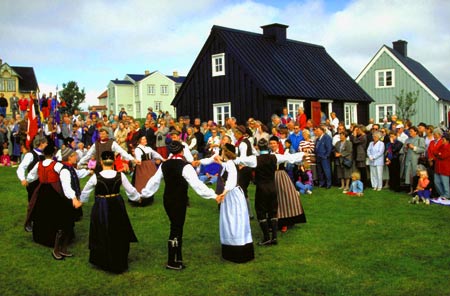
Native Icelanders
The best country to live is Iceland
Iceland is recognized by the UN as the best country in the world to live. This, according to ITAR-TASS, is stated in the annual report of the United Nations Development Program (UNDP).
When compiling the rating, UNDP experts take as a basis such indicators as life expectancy, level of education, gross national product, etc. The UN has published such ratings annually since 1990.
Over the past six years, the first place in this ranking has been occupied by Norway, which this year is in second position. Norway is followed by: Australia, Canada, Ireland and Sweden. The last places in the ranking this year were taken by Sierra Leone, Burkina Faso, and Guinea-Bissau.
Iceland (“ice country”) is an island nation located in the North Atlantic Ocean. The territory of the state consists of the island of Iceland and small islands around it. The northern point of Iceland reaches the Arctic Circle, and the southern point is 306 km away. from her. The population of Iceland is about 250 thousand people
Despite its name and the presence of glaciers, Iceland is by no means an Arctic country. Its climate is moderated by the warm waters of the North Atlantic Current (a continuation of the Gulf Stream), a branch of which runs along the southern and western coasts of the island, as well as volcanic heat from the soil and thermal waters. Thanks to these factors, the weather there all year round resembles October in central Russia.
Iceland was settled in the 9th - 10th centuries and since then it has been inhabited mainly by the descendants of the first settlers; later immigration to the island was limited. Until the mid-20th century, the majority of the population lived on isolated farms. In the history of the country, sharp declines in the number of inhabitants have repeatedly occurred due to epidemics, volcanic eruptions, earthquakes and famine.
The 20th century saw constant population growth (1.5% per year) and migration of rural residents to cities. Currently, 95% of the population lives in cities and towns, with 40% concentrated in Reykjavik. In the northern part of the country, settlements are concentrated along the coast and in river valleys. 20% of the country's territory is uninhabited.
Icelanders are predominantly of Scandinavian origin, being mainly descendants of the Vikings. Part of the population are descendants of Celts from Ireland and Scotland. The Icelandic language, which is essentially a dialect of Old Norse, has changed little in 1000 years, and modern Icelanders can easily read the ancient texts. Only 6% of the population are people of foreign origin.
The country is a republic. The head of state and parliament are elected by universal suffrage, with all citizens of the country, men and women over 18 years of age, who have lived in Iceland for at least 5 years before the election, having the right to vote.
Iceland is not a member of the European Union. The main problem is the presence of quotas in the EU for fishing, the main sector of the country's economy.
Modern Icelanders live in solid, spacious houses with well-functioning heating systems, which are considered to be among the best in the world. In ancient times, farm houses and some city houses were built from peat, but there are virtually none left. Until recently, the main building material was wood, but now it is usually stone and concrete.
Due to rapid population growth, especially in the Reykjavík area, government housing programs became necessary and many new houses were built in and around the capital.
Indicators of the state's concern for the health of the population are long life expectancy (76 years for men and 81 years for women) and very low infant mortality (about 5.3 per 1000 births).
There are 25 hospitals that provide medical care, including surgical care, at the highest level. Tuberculosis was once a real scourge in Iceland, but it has now been virtually eradicated.
There are virtually no poor people in the country and class stratification is less pronounced than in many other countries. Increased prosperity was accompanied by increased economic and social security and equality.
Icelanders almost always refer to each other by their first names. Accordingly, all telephone and other directories list names in alphabetical order. The reason is that very few people in Iceland have surnames. For children, the "patronymic" is given by the father's name, with the ending -son (son) for boys and -dottir (daughter) for girls.
It is also interesting that despite all the achievements of high technology, more than 80% of Icelanders believe in the existence of elves, trolls and other fairy-tale creatures. Even today, the final authority in the design of roads and the construction of buildings is not architectural and technical institutions, but folk beliefs and stories of grandparents about the habitats of elves. If the designed road or building can disturb the peace of the supposed habitats of fairy-tale characters, the project is unconditionally changed.
Life in Iceland
To judge life in Iceland, you need to turn to official sources of information, for example, the website of the Organization for Economic Cooperation and Development. It reflects not only dry facts about per capita income, but also shows the standard of living of residents, in their own opinion. Isn't this the truth that extras can keep silent about?
So, about 80% of the active population was officially employed in 2021, this is a very good indicator. The average family income after taxes is $24,000, which is not too much, but people consider this value to be normal. Education, one way or another, affects income and employment, and Iceland is slightly behind the world indicators: only 70% have a high school diploma.
Health care and good ecology have a beneficial effect on the life expectancy of Icelanders; there is every chance of living to 80 years.
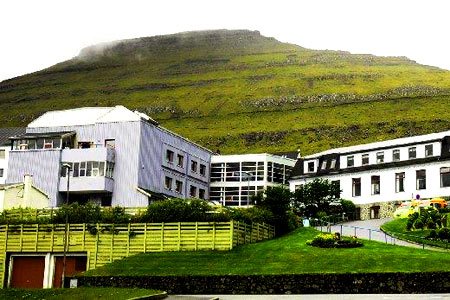
Hospital building in Iceland
A high standard of living is manifested in the personal position of each citizen in relation to the whole society and the future. Thus, about 96% of the island’s inhabitants have true friends and, in general, trust politicians; Voter turnout reaches 80% and represents the good citizenship of the population.
About 85% of people are satisfied with their lives and consider themselves happy.
Economy of Iceland
Let's talk in more detail about work, because it is thanks to a constant income that a person buys goods and services and is the engine of trade that contributes to the development of the economy of the region as a whole.
We have already said that 80% of the adult active population has a job, and 90% are people with a diploma. There are more men employed than women, but the difference is small.
The average annual salary in Iceland is 40,000 US dollars or 3,300 per month: 20% of people earn above and below average income, but in general the state provides equal opportunities, regardless of gender, age and education.
There is practically no long-term unemployment in the country; only about 13% of the active population is currently looking for work.
Now let’s touch on the issue of pensioners, who become citizens (about half of all) aged 65–69 years. Perhaps, among all Europeans, these are the most courageous and risk-ready pensioners, because there is no age limit for retiring.
A person can do this earlier, but then his income will be very small compared to others, so people work as much as they want.
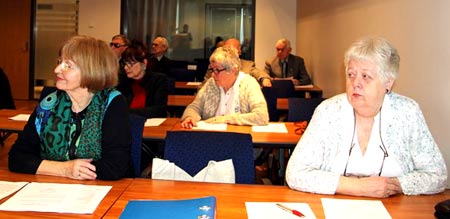
This pattern exists in all Scandinavian countries, which probably explains the stable social life. Pensions in Iceland average $1,550, which is again comparable to all Scandinavian countries and considered quite high in Europe.
Prices for basic products in the capital Reykjavik in 2015: water costs 2 US dollars, you can buy bread for the same amount; a dozen eggs will cost twice as much; 1 kg of chicken breasts sells for US$20, while a bottle of wine costs US$17 on average.
As you can see, prices are much higher than in Moscow. A liter of gasoline costs $2.07, which is again higher than today in our capital.
This high cost of living also applies to housing, whether renting or buying your own apartment. 1 sq. m of housing in a residential area of Reykjavik costs $2,200 versus $2,800 in the city center.
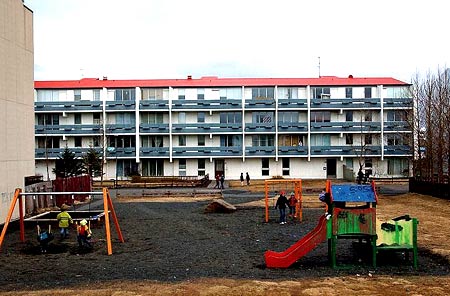
Residential building in Reykjavik
You can rent a one-room apartment in a residential area for $880, and in the center for $1,170. However, for a three-room apartment in the center you will have to pay only $1,800. This is more or less the same with the Moscow rental market.
About conservatism
From the outside, Iceland may seem like an extremely liberal country. The doors to the houses here are not locked. Any person from the street is welcomed as a long-awaited guest. There is no army in the country, and almost no police either. The products are standing on the street without any sellers. A naked person in a public place is a common occurrence, and sexual orientation does not have conservative social labels. But in fact, Iceland is one of the most conservative countries in the world.
It is extremely difficult to obtain a residence permit here. Moreover, Icelanders are so meticulous that they even have a special language commission. For what? If a foreign word is introduced into the language, then the commission is engaged in creating a local equivalent for it. For this reason, the Icelandic language is perhaps the only one that has almost no archaic forms, words with emasculated meaning and other relict phenomena.
The language in which the skalds wrote the Elder Edda 1,000 years ago is the same language in which it is read now. Iceland is very jealous of everything national; literally everything here is shrouded in traditions. Every encyclopedia says that the local parliament (Althing) is considered the oldest in Europe - it is 1,000 years old. Icelanders also wanted to join the EU, but changed their minds.
In general, if you decide to splash in the geysers and admire the northern lights, fill your suitcases with Icelandic crowns and go on a trip! True, in this country it is better to use credit cards, since paying in cash is not accepted here.
Are you wondering how waiters and other service personnel live without tips? They live great! Leaving a tip in Iceland is considered an insult.
Icelandic foreign policy
This country is not as closed from the outside world as it might seem at first glance. The fact is that non-entry into the EU does not mean the end of the country’s economic development or its trade relations.
On the contrary, Iceland has been a member of the Nordic Council, which includes seven other Nordic countries, since the 1950s; since 1949, it has been a member of NATO, and has absolutely no military forces of its own (it is guarded by units of the organization from other countries); Iceland occupies a place of honor in the IMF, UN, and World Bank.
Its main business partners are Britain, the USA and Germany.
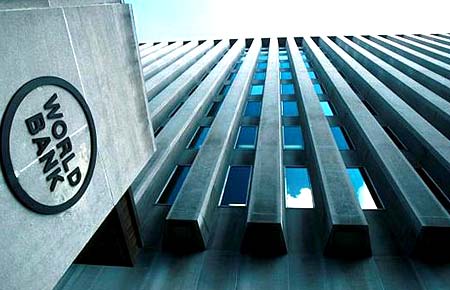
World Bank Headquarters
Since the collapse of the USSR, our countries have been interacting well under a number of economic agreements. Particularly promising are dialogues on increasing fishing, the aluminum industry and tourism.
Iceland and the European Union
Iceland's relations with the European Union (hereinafter referred to as the EU) are complex. An application for membership was submitted back in 2009; the country's current president won the election thanks to promises to improve the quality of life of the population after Iceland was approved as a member of the EU.
Many expected membership to take place by 2011, but the situation changed dramatically by 2013. The fact is that the main income of many Icelanders is still associated with fishing, for which the EU decided to reduce quotas in order to redistribute them among other coastal states.
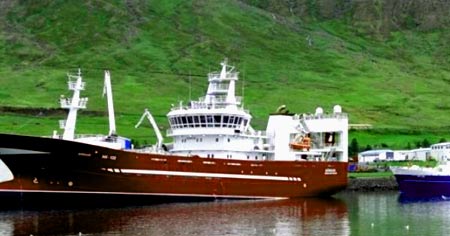
fishing boat in Iceland
This situation did not suit the Icelanders, and they demanded that the government hold a referendum. It was at this point that the decision was made to withdraw the application. A proud nation has decided not to belong to the European Union. This did not suit some people, there were rallies, but in general the life of Icelanders remained the same.
Iceland is not a member of the European Union and will not join it under the conditions that Brussels put forward to it. In 2015, it withdrew its application to join the EU.
Iceland and the Schengen Agreement
Since 1996, Iceland has been part of the Schengen zone; a visa to Iceland gives the right to visit all other countries party to the agreement. It also left a significant positive imprint on its foreign policy with neighboring countries and the rest of the world.
Internal migration among the Schengen countries remains at approximately the same level, although less developed countries are losing their residents to rich countries. External migration of the population is practically absent in Iceland. There are very few states in the world that could boast of the absence of foreign residents.
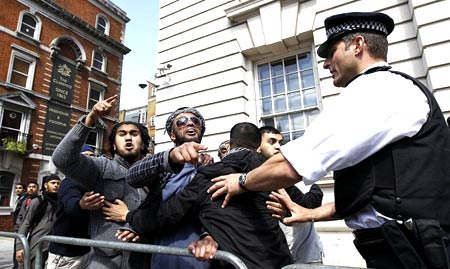
Migration policy of the country
We smoothly move away from the topic and dive into the very essence of the national character of the descendants of the Vikings. The fact is that this country is nationalistic, which affects the reluctance to replenish the country’s population at the expense of migrants.
More than 98% of the inhabitants are native Icelanders. A small share is occupied by visitors from the northern neighboring countries of Europe and isolated cases - refugees from Asia.
Foreigners are allowed to visit the country, admire the beauty, replenish the treasury through tourist spending and that’s it. All newcomers are given temporary resident status with the goal of getting rid of them in the near future. This means a refusal to provide work to refugees, that is, there is no incentive to transport all of their relatives to Iceland, which many EU countries did at one time.
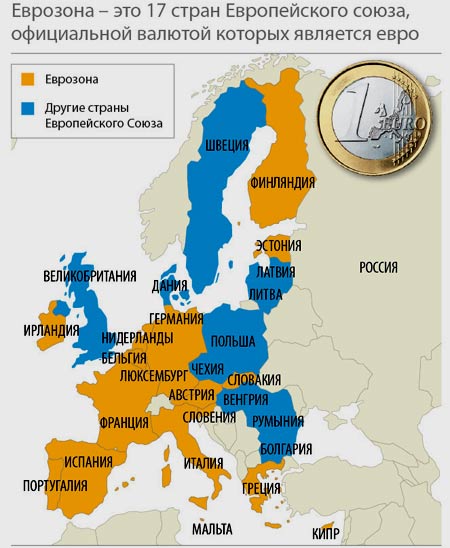
The Lutheran Church and its influence on the worldview of the Icelanders also reinforces the reluctance to share shelter with strangers, as Lutherans fought throughout their lives for the right to found their own church and legally attend it (Christians historically resisted and considered this faith sectarian).
Along with the official religion, Icelanders believe in elves, gnomes and sorcerers, who, by the way, are depicted in the robes of bishops.
At the beginning of the 20th century, the laws of the country called on all immigrants to change their names to Icelandic ones, and generally abandoned surnames. Even today, many names consist of a first name and a middle name (sometimes the mother’s name is taken as a basis). Only since the 90s of the 20th century were immigrants allowed to keep their original names and surnames.
What little immigrants the country has consists of refugees from Southeast Asia, political refugees from some countries (they have proven they are being persecuted for political reasons), and migrant workers. The number of marriages with foreigners is very small, which does not affect the growth of migration.
Russian-speaking residents
From the official statistics of the embassy, we can conclude that about one thousand people from the CIS countries live in Iceland, about 300 residents are Russians. The Russian-speaking layer of the population here was formed in the 90s of the 20th century, at the stage of labor migration. The number of this community is expected to increase at the present stage of development, when the political and economic situation in the country forces Russians to migrate to other stable states.
The working life of Russians in Iceland is improving in the sports field; a large percentage of immigrants from Russia are employed here as coaches in volleyball and gymnastics, basketball and handball. This category of Russian-speaking diaspora is concentrated in the capital. Some foreigners find work in small towns. They realize themselves in the construction industry and find employment in fish processing enterprises. A small percentage of newcomers take up positions as translators, doctors or teachers. The amount of wages will depend on working conditions. If, for example, you work in Iceland as a waiter or dishwasher and receive free food and housing, then you can live comfortably and securely here.
